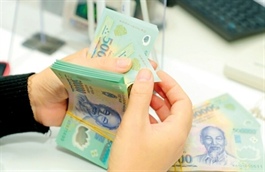Policy interest rate expected to further reduce in H2 2023
Policy interest rate expected to further reduce in H2 2023
The State Bank of Vietnam (SBV) may further reduce its policy interest rate if the Fed’s monetary policy reverses in the second half of this year, according to analysts from VNDirect Securities Company.

The analysts also expect the average 12-month deposit interest rate will drop to 7 per cent per year in 2023.
Though deposit interest rates have decreased by 0.5-2 percentage points per year for all terms in recent months, especially after the SBV reduced its policy interest rates on March 15 and April 3 this year, lending interest rates have had a lower decrease compared to the reduction of deposit rates, except at State-owned banks, which has caused difficulties for many firms needing capital.
Ly Kim Chi, chairman of HCM City Food Association and vice president of HCM City Business Association, said with loan interest rates around 10 per cent per year, firms will struggle to recover. Therefore, she suggested that the SBV further reduce its policy interest rate by 0.5 percentage points to create conditions for banks to reduce lending rates.
According to banking expert Can Van Luc, net profit margin (NIM) of banks in 2022 was 3.5 per cent, higher than 3.2 per cent in 2021. In 2023, banks' NIM will likely return to the level of 2021. This year, both the Government and the SBV have requested commercial banks to reduce interest rates. Many commercial banks have deployed preferential interest rate loan packages to stimulate credit demand.
Explaining the current high lending interest rate, the SBV said the banking system is still the main capital provider for the economy. Viet Nam's economy depends mainly on bank credit capital with the credit-to-GDP ratio at the end of 2022 being 125.3 per cent while the capital demand for economic development is always high, which creates pressure on lending interest rates.
After the COVID-19 pandemic, the economy recovered so the capital demand for production and business increased, the banking system used the maximum amount of raised capital to provide capital for the economy. Currently, the gap between deposit and credit in Vietnamese dong is at VND167 trillion and the ratio of credit per deposit in the dong is at 101.4 per cent, slightly down from 102.3 per cent at the end of 2022.
The banking system mainly raises short-term capital (about 88 per cent of deposits have a term of 12 months or less), but it still has to meet the medium- and long-term lending needs (more than 52 per cent of the dong-denominated outstanding loans of the banking system is medium and long term). Therefore, it has put pressure on deposit rates.
Besides, Viet Nam deeply integrates into the global economy so fluctuations in the world's financial and currency markets have a strong and rapid impact on domestic interest rates and exchange rates. The world’s interest rate level increased in 2022 and remained at a high level in the first months of 2023. Major central banks also continue to implement the roadmap to tighten monetary policy.
In addition, domestic inflation pressure also affects interest rates. Average inflation in the first four months of 2023 was at 3.84 per cent and core inflation was at 4.9 per cent, while the inflation target for 2023 is 4.5 per cent.
Inflationary pressure makes people expect a positive real interest rate, so it is difficult for banks to reduce deposit rates, leading to banks’ high input costs. Therefore, raised capital of the whole industry as of April 27, 2023 only increased by 1.78 per cent, while the credit growth rate was 3.04 per cent, which makes it difficult for banks to cut lending interest rates.
Pham Chi Quang, director of the SBV’s Monetary Policy Department, said lending interest rate cut in the market was slower than that of deposits because banks had previously raised deposits at high interest rates. Besides, each bank has a different interest rate reduction roadmap depending on their cost of raised capital and financial strength.
According to the SBV, the lending interest rate is agreed upon by banks and the customer according to the market capital supply and demand and the customers’ credit level.
However, on the basis of macro-economic developments as well as domestic and foreign monetary markets, the SBV will study and control interest rates in accordance with the macro balance, inflation and monetary policy target. It will also encourage banks to implement cost-saving solutions to reduce lending interest rates in order to support firms and households to recover and develop production and business.






















